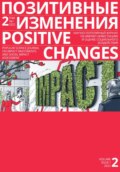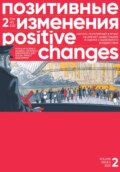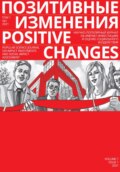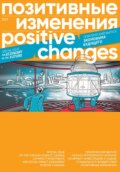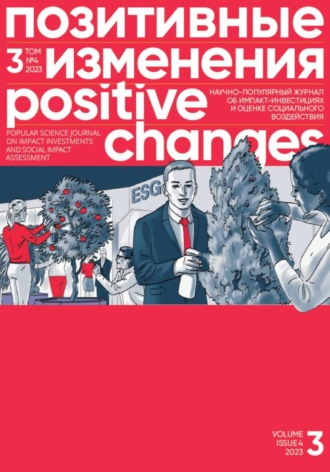
Редакция журнала «Позитивные изменения»
Позитивные изменения. Том 3, № 4 (2023). Positive changes. Volume 3, Issue 4(2023)
We Are the Impact. A Report from the Positive Changes Journal Awards
Yulia Vyatkina
DOI 10.55140/2782–5817–2023–3–4–32–41

On November 30, 2023, the pages of Positive Changes Journal came to life as it celebrated the winners of its second annual Social and Economic Impact Assessment Awards. The evening’s award ceremony itself turned out to be a source of positivity, leaving a lasting impression on all who attended. Join us as we provide you with an overview of the ceremony, the deserving awardees, and the evolving landscape of social impact assessment over the past year.

Yulia Vyatkina
Editor, Positive Changes Journal
As the evening of November 30 unfolded, the Impact Hub Moscow filled with warm atmosphere. Guests engaged in friendly conversations, shared joyful embraces, and wore bright smiles while reflecting on the various business events of the season. They also discussed work-related matters, all while anticipating the commencement of the award ceremony. Little did they know that the evening would not follow the typical script of handing out statuettes but would instead feature an engaging performance centered around the theme of impact, with everyone in the audience becoming a part of the narrative.
Throughout the evening, metaphors abounded: “Impact represents beauty, professionalism embodies love, and evaluation is an art.” These metaphors were brought to life on stage by the talented actors of the community theater, This Is Us. The audience was treated to a nostalgic symbol of the New Year – a cotton-clad Santa Claus from their childhood. They delved into the profound Japanese concept of “shu-hari” – obedience, deviation, and separation – and explored its relevance to social change. Discussions also revolved around how presentations at business conferences can be made more engaging and why individuals involved in making an impact can be seen as modern-day superheroes. The overarching message was clear: not only Tuesdays can be giving.
“Visualizing the upcoming awards ceremony, our team we realized that the event itself had to be a catalyst of positive changes. If we were to simply seat the experts in a row and request their insights, it would be yet another high-level professional discussion. That’s why we opted for a format in which every one of our guests could serve as a conduit for positive change, initiating revelations and insights. This format made sure these two hours would be an extraordinary experience for everyone present, inspiring and evoking admiration for the seamless and organic interaction among people when they realize that, just like life itself, theater is a reflection of ourselves,” says Natalia Gladkikh, Editor-in-Chief of Positive Changes Journal.
The theme of impact even extended to the refreshments provided for the ceremony’s attendees. One of the partners of the Awards is “Different Grains” (“Raznye Zerna”), Moscow’s first inclusive café, where adults with ASD work alongside professional chefs, baristas, couriers and waiters. On December 30, 2023, the café celebrated its one-year anniversary, with the Positive Changes Journal Award being its first venture into catering. This collaboration could pave the way for exciting developments for Different Beans in 2024.
What unites the guests and award winners is a shared commitment to making a positive contribution to society. Each individual aspires to create sustainable models for bringing about positive change while striking a balance between their mission and financial viability. Hence, the award’s statuette carries deep symbolism: a surfer gracefully riding the waves on a board bearing the word “Impact.” This image, which first graced the cover of Issue 3 in 2022, quickly captured the hearts of readers and the editorial team, eventually finding its place in the publication’s merchandise. However, the essence of evaluation lies in its tools. For those immersed in the world of impact, the ability to measure their influence holds special importance in a world where rapid change has become the norm. In the 2023 statuette, a hygrometer was introduced as a symbol of measurement, adding both meaning and practicality by allowing for the monitoring of an essential parameter: the humidity level in the air.
So, without further ado, let’s meet those who have fascinated our editorial team in terms of impact evaluation and are rightfully honored as the recipients of the 2023 awards!
“DEVELOPMENT OF SOCIAL IMPACT ASSESSMENT AS AN INSTITUTION” CATEGORY
In this category, the editorial team of the journal has recognized Zerno Ventures, a venture capital fund, and the Donors Forum Association of Grant-Making Organizations.
Zerno Ventures was awarded the statuette for their groundbreaking research on impact investing in Russia and the development of a methodology for evaluating impact startups.[48] This marks a significant milestone for this young and ambitious fund, which focuses its investments on projects with a notable social or environmental impact.
“We have pioneered the development of an impact investing evaluation methodology in Russia, setting a precedent in this field. It is truly remarkable that we were able to engage experts and the broader community in the collaborative creation of this methodology. Subsequently, we conducted a comprehensive analysis of the venture capital landscape in Russia based on our methodology. Our findings reveal a growing market with impact-driven projects thriving amidst the current dynamics. We earnestly hope that our research will serve as an inspiration for the emergence of new impact projects, encourage businesses to assess their societal contributions, and promote the scaling of initiatives fostering positive change in our nation,” said Maria Gerasimova, Investment Director of Zerno Ventures.
The Donors Forum Association of Grant-Making Organizations has also been honored with an award for their pivotal role in formulating and implementing reporting standards as part of the All-Russian competition of annual reports for NGOs, known as “Point of Reference” (“Tochka Otscheta”).[49]
“Credit is due to all who have played the roles of co-creators, co-organizers, partners, and experts throughout the history of the Point of Reference project. The culmination of our collaborative endeavors has given rise to a set of metrological standards that presently serve as a benchmark and a guide for NGOs as they prepare their annual reports,” notes Alexandra Boldyreva, Executive Director of the Donors Forum Association of Grant-Making Organizations.
The Donors Forum is actively involved in various educational programs and webinars aimed at explaining the significance of crafting annual reports for both external communication and internal reflection within organizations. Through the Point of Reference initiative, they have witnessed that their work and the broader sector’s endeavors are yielding tangible results.
“The quality of annual reports is steadily on the rise, as evidenced by the growing percentage of organizations receiving gold and silver reporting standards. Regional competitions are also on the rise, increasingly adopting the recommendations and competition guidelines provided by our project. This convergence of the information landscape encompasses diverse categories of non-profit organizations, spanning from small to large entities, metropolitan to regional NGOs, signifying a pivotal advancement for the overall development of philanthropy in Russia,” explains Alexandra Boldyreva.
The Donors Forum aspires to leverage the Positive Changes Award as a catalyst, inspiring non-profit organizations participating in the 2024 Point of Reference program to more enthusiastically integrate monitoring and evaluation tools into their project activities. “Particularly for small NGOs in regional areas, it is paramount to recognize that their initial steps toward MEL (Monitoring, Evaluation, and Learning) will be acknowledged and supported. On our part, we are committed to ensuring that the application of assessment tools during the annual reflection process for NGOs participating in the Point of Reference program is as comprehensible and accessible as possible,” concluded the Association.
“DEVELOPMENT OF IMPACT ASSESSMENT IN THE PRACTICE OF SOCIALLY ORIENTED PROJECTS” CATEGORY
In this category, three distinguished recipients share the honor of the award: Reach for Change Foundation, PROOcenku Club, and Siberian Center Holding.
Reach for Change Foundation is commended for its pioneering efforts in implementing a data-driven approach to evaluate projects within the realm of social entrepreneurship.[50] Since 2012, the foundation has been helping develop projects by social entrepreneurs, which are aimed at improving the quality of life of children and youth throughout Russia. What sets them apart is their remarkable ability to engage accelerator participants in the intricacies of evaluation, diligently and consistently assisting them in establishing a robust evaluation framework.
“Accelerators that collaborate with social entrepreneurs are increasingly incorporating evaluation into their training programs and prerequisites. Aspiring entrepreneurs are now arriving at our competition more prepared with a better understanding of evaluation. Beyond our sector, we observe that business accelerators and entrepreneurial communities continue to express interest in this topic, albeit with a broader interpretation of the term ‘impact’ and a slightly different perspective on evaluation. Some entrepreneurs believe that the significance of impact assessment is overemphasized, while others fail to comprehend how assessment can be conducted without considering financial indicators – a rarity in practice within the social sector. It appears that a fresh business perspective on evaluation within our sector would be beneficial. Conversely, I believe that the business world would also find value in the sector’s expertise in this domain,” states Sofia Shaginian, Head of the Impact Startup Support Program at Reach for Change Foundation.
The PROOсenku Club[51] receives recognition for its invaluable contribution to fostering an expert community in the field of project and program evaluation. This club convenes monthly online meetings under the banner of “An Interesting Conversation in a Good Company.” The Club’s mission is to support a community of practitioners dedicated to integrating evaluation into the work of socially oriented organizations. Education, level of training in evaluation, and practical experience are not important for the participants.” The founders of the club are Process Consulting, Siberian Center Holding and Garant Group of NGOs.
“The essence of our club lies in coming together once a month for insightful discussions on evaluation-related topics in an engaging manner. We maintain an open-door policy, extending our invitation to anyone seeking to advance the cause of evaluation within their organizations. This means that anyone can attend, listen, share their insights, and pose questions to our panel of experts. We think we are doing quite well: more than 300 people already attended, and initiative has been met with enthusiastic response. So we believe that we’ve successfully filled a void in the landscape. Now, every month, you have the opportunity to engage in a fruitful discussion on evaluation within a supportive community,” affirms Alexey Kuzmin, Co-Founder of the PROOcenku Club and CEO of Process Consulting.
The Siberian Center Holding is another deserving recipient of this category’s award. Since 1996, the organizations under the holding’s umbrella have been dedicated to training leading personnel in NGOs. Beginning in 1999, they embarked on a journey to champion the cause of evaluating social projects and programs.[52]
In 2023, their project, “Formation of an Ecosystem for Learning and Enlightenment in the Field of Evaluation in the Social Sphere,” devised in collaboration with partners, secured co-financing from the Presidential Grants Fund. It introduces a three-tiered approach to education:
• The Professional Level involves a comprehensive 144-hour-long qualification enhancement course in evaluation, featuring both face-to-face and online sections.
• The Actualizing Level offers a condensed 24-hour professional development course in evaluation, available exclusively online.
• The Supporting Level focuses on disseminating knowledge in the field of evaluation and facilitating the exchange of experiences through community gatherings, modeled after the PROOcenku Club meetings.
For seasoned evaluators – those who have either conducted external evaluations, coordinated such evaluations, or commissioned them – an Evaluation Institute has been established.
“When we conceived this educational program, we consulted with legal experts and the Ministry of Education and Science of Russia. Our aim was to amalgamate expertise from various fields, including sociology, fundamental and applied sociological research, and financial consulting. After all, evaluation is all about determining effectiveness,” explains Irina Reshta, Project Coordinator at InA-Center Association and Vice President for Program Affairs at Siberian Center Holding.
The architects of this project conducted an indepth analysis of the educational landscape for evaluators in Russia, identifying two primary groups of prospective clients for their training programs. On the one hand, there are those who seek concise training. Often, individuals in this category lack a precise understanding of which competencies to develop. On the other hand, there are specialists who desire more extensive, long-term training, complete with guidance, support, and direct interaction with educators. These individuals are willing to invest in their education, yearning to become part of a professional community, and they possess a clear understanding of which competencies they need to reinforce and what contemporary knowledge they need to acquire.
By July 2024, the project’s organizers plan to train 100 NGO employees in Russia, with state education documents issued for them.
“PERSONAL CONTRIBUTION TO THE DEVELOPMENT OF SOCIAL IMPACT ASSESSMENT IN VARIOUS PROJECTS AND PROGRAMS” CATEGORY
In this category, we also have three winners: Natalia Kosheleva, Irina Efremova-Garth, and Vladlen Zamorsky.
Natalia Kosheleva, a consistent contributor and expert for the Positive Changes Journal, a featured guest on the Positive Changes Factory podcasts, and a board member of the Association of Program and Policy Evaluators (ASOPP), received her award with gratitude towards the magazine’s editorial team and the Positive Changes Factory for providing a platform to discuss the topic of evaluation.
“Thanks to the Positive Changes Journal, I have authored articles in Russian about two evaluation methodologies – Outcome Mapping[53] and Outcome Harvesting.[54] I’ve also had the opportunity to discuss these methodologies on the journal’s podcasts.[55] Subsequently, I mustered the courage to conduct a webinar on the same topic during the ASOPP conference. The response was heartening, with people expressing relief that we’ve finally introduced a methodology suitable for their projects. This is truly gratifying for me, as I typically feel reserved about discussing matters I haven’t personally crafted. Sharing insights into these methodologies represents progress for me, and it has proven to be beneficial to others,” Natalia Kosheleva remarked.
Irina Efremova-Garth, another regular contributor and expert of the magazine, and the Director of Sustainable Development at Mobius Technologies, has used the pages of Positive Changes to delve into the perspectives of grant-making organizations on evaluation in the present and future.[56] She has also shared her views on the role of knowledge and knowledge management practices within philanthropic organizations,[57] in addition to providing insights into the professionalization of evaluation in both Russia and globally.[58]
In her response, Irina noted the burgeoning interest in social impact assessment and introduced a synonym for the word “impact” – “transformation,” as suggested by participants at a conference in Karachay-Cherkessia.
“Impact revolves around the image we aspire to create. We recognize the paramount importance of visualizing this image. If you embark on a venture armed with a clear vision of your intended outcomes, you can subsequently gauge whether you’ve reached your desired destination. I believe ’transformation’ serves as an excellent synonym for ’impact,’ and I encourage everyone to embrace it,” expressed Irina Efremova-Garth.
Irina also emphasized that social impact assessment is gaining increasing significance within the donor community. This is because the pool of available resources remains constant, while the responsibilities entrusted to decision-makers regarding programs and investment projects are incredibly huge.
“Colleagues within the donor community are actively engaging a diverse array of experts to explore evaluation approaches from various perspectives. This growing interest is resulting in methodologies, practices, and solutions that are becoming accessible to all stakeholders, which is especially heartening. You can experiment with these solutions or methodologies, provide feedback, enhance and adapt them, ensuring that the projects and programs into which you invest your resources, time, and expertise achieve the highest possible levels of effectiveness,” Irina Efremova-Garth noted.
Vladlen Zamorsky, the Chief Executive Officer of Better, the Chief Sustainability Officer of Okkam, and the Co-Chair of the Sustainability Committee at the Association for the Development of Interactive Advertising (ARIR), received recognition for advancing practices in evaluating the media effectiveness of social projects. Vladlen played a pivotal role in evaluating the impact of the Khabensky Foundation’s #this-cannotbecured #cancercanbecured campaign, which was featured in the pages of Positive Changes Journal.[59]
“Media plays an indispensable role in addressing social and environmental challenges. Without media, knowledge and trust-building become unattainable, which in turn hampers efforts to influence behavioral change – and without these attributes, social change is out of the question. Consequently, all outreach campaigns should undergo thorough measurement. Fortunately, there exists a wide array of tools and approaches for this purpose. This is why none of our media campaigns proceed without comprehensive measurement. Efficiency is the cornerstone of our approach. I strongly recommend that social projects also leverage industrial methodologies that enable the measurement of all aspects related to communication effectiveness,” Vladlen Zamorsky advised.
Furthermore, the award recipient expressed his appreciation for our journal, stating, “This is an outstanding project in terms of both content and form. It is commendable that a substantial amount of meticulously curated, high-quality scientific content is emerging, driving the entire sustainability industry forward by enabling the measurement of its impact.”
“DEVELOPMENT OF SOCIAL IMPACT ASSESSMENT METHODOLOGY” CATEGORY
The accolade in this category was awarded to the Vladimir Potanin Foundation for its pivotal role in evolving the methodology for assessing investments in mass sports.[60]
“Significantly, we are witnessing a shift towards more adaptable and diverse approaches to evaluating and scrutinizing experiences. In this VUCA (Volatile, Uncertain, Complex, Ambiguous) world, the necessity arises to discard many erstwhile immutable rules that have ceased to be effective. Therefore, a noteworthy trend for 2023 and a driving force for 2024 can be defined as adaptability, audacity, and a willingness to experiment. This paradigm shift is substantiated by the category in which our foundation has been honored. The assessment of investments in mass sports, much like in several other social domains, is now an amalgamation of issues and mechanisms that were previously unconventional to consider collectively. For instance, it encompasses financial and social impacts, but not limited solely to the realm of SROI,” emphasizes Irina Lapidus, Program Director of the Potanin Foundation.
“BEST CASE OF IMPACT ASSESSMENT INTEGRATION IN THE ACTIVITIES OF A SOCIAL ENTERPRISE / SOCIALLY ORIENTED NGO” CATEGORY
The Our Children Foundation was bestowed with an award for its successful implementation and propagation of evidence-based social project design practices.[61] The Foundation has been working with orphanage residents and graduates since 2006.
Since 2018, it has been focusing on preventing social orphanhood by assisting families at risk of child removal, thereby preventing children from being taken into orphanages in the first place. The mission of the Our Children Foundation revolves around transforming the child protection system within the country, ensuring that children grow up in nurturing family environments, ultimately emerging as prosperous adults. By embracing and employing evidence-based practices, the Foundation becomes an important partner to the government agencies and businesses, and it enables the Foundation to scale its activities more effectively. Notably, four of the foundation’s practices have earned inclusion in the federal registry of evidence-based practices.
“I strongly advocate for evidence-based philanthropy, and I am glad to witness our sector finally embracing rigorous self-assessment. Today, it is inconceivable for any reputable charitable foundation to abstain from evaluating its own operations. It serves as a hallmark of a well-established, mature organization. At Our Children Foundation, we embarked on the path of evidence-based philanthropy and the incorporation of evidence-based approaches quite some time ago. We have established an entire methodology department that diligently focuses on monitoring the outcomes of our programs. We strive to integrate the assessment findings into our projects. This is a constant, cyclical process: we take a look, analyze what worked or did not, repeat it from the start, introduce new approaches and technologies, see how it changes the outcome and then move on. Understandably, evaluation is not a task that can be approached in a piecemeal manner; it is a process that demands both time and resources. However, the resulting impact is exceedingly positive, serving as a testament to an organization’s dedication to continually enhancing its effectiveness,” remarks Natalia Petrova, Director of Our Children Foundation.
“BEST REGIONAL–LEVEL SOCIAL IMPACT ASSESSMENT PROGRAM” CATEGORY
The award in this category has found its home in the Polar Region, specifically, in the Our Norilsk Endowment Fund, for its pioneering implementation of a social investment evaluation model that takes into account its contribution to regional development.[62] The Fund’s mission is to propel the social advancement of Norilsk city and the Taimyr Dolgano-Nenets Municipal District. Its primary goal is to facilitate longterm regional investments and provide financial support to non-profit initiatives focusing on education, healthcare, culture, and sports, amongst other socially significant areas.
“In 2023, it was imperative for us to develop our own evaluation model to use in respect of every project supported by the Fund. The model needed to be tailored meticulously to align with our organization’s objectives, given our distinct priority areas for support. Our aim was to devise a versatile solution that could be universally applied across diverse project types. This was no small feat, particularly considering the existence of projects where isolating the economic component and measuring social impacts prove to be formidable challenges. Nonetheless, we rose to the occasion,” says Anna Makukha, Director of Our Norilsk Endowment Fund.
The Fund aspires to serve as an exemplar for other grant-giving entities, irrespective of whether they are endowment funds or major corporations engaged in corporate social responsibility programs. “The incorporation of an evaluation model into their programs represents a positive trend that promises to revolutionize approaches to social project development, and we are delighted to be at its forefront,” adds Anna Makukha.
Over the past few years, the realm of social impact assessment has transcended the confines of a highly specialized professional enclave. Today, we bear witness to the fruits of initial endeavors that stood as isolated cases two decades ago but have now proliferated into a multitude of domains. The laureates of this award encompass companies, NGOs, and specialists who implemented innovative approaches, set new benchmarks, refined methodologies, and cultivated communities of expertise. They are collectively driven by the pursuit of answers to questions regarding the optimal utilization of available resources, the consequences of our actions, and the potential for alternative strategies. Their focus is squarely on accomplishments that contribute to the greater good.
“Despite its seriousness and scientific approach, our award celebrates beauty. This is the beauty of projects, which becomes evident when we move beyond the dry statistics of events and participants to recognize the stories of transformation – what we refer to as ’impact’,” said Natalia Gladkikh, editor-in-chief of the journal. “For the second consecutive year, we have been honoring those who help organizations fully embrace the beauty within their work. Through our award, our aim is not only to acknowledge individuals and teams but also to inspire new projects to create positive changes in the world. Because impact is not just about today; it’s mostly about shaping a better future.”
Our team’s heartfelt congratulations extend to the awardees, and we express our gratitude to our partners: Wowhouse Branding Agency, the Gladway Foundation for the Development of Media Projects and Social Programs, the Different Beans Inclusive Café, and the This Is Us Community Theater. For additional information about the award and a visual chronicle of the event, please visit the website https://www.impactawards.ru/.



